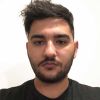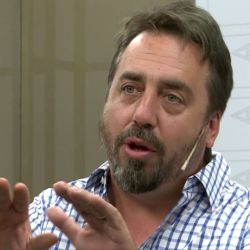Environmental damage, land clearances and elimination of mining restrictions in areas near freshwater glaciers – these are the direct effects of the sweeping economic deregulation package proposed by President Javier Milei in environmental matters in his now infamous Urgent Decree 70/2023 and in the so-called “Omnibus law” sent by his administration to Congress, warns Enrique Viale.
To sum up, “a liberalisation of our territory" that would allow "destruction, agro-business and real-estate speculation,” concludes Viale, an environmental lawyer and activist.
With the decree and bill, Milei and his team seek to do away with any territorial and environmental limitations protecting the nation's biologically rich areas from human advancement and destruction. Argentina's new government intends to wipe out historic legislative conquests that achieved the protection of resources and natural paradises, opening the door to economic exploitation, warns Viale, the founder of the Argentine Association of Environmental Lawyers.
Specifically, the text of Milei's "Ley de Bases y Puntos de Partida para La Libertad de los Argentinos" (“Law of Bases and Starting Points for the Liberty of Argentines”) intends to introduce major changes to the Glaciers Law (Law 26,639), the Native Forests Law (Law 26,331) and the Environmental Protection against Fires Law (Law 26,562).
Glaciers
Argentina's Glaciers Law sets minimum standards for the protection of large mass of perennial ice and the areas closest to them. In an interview with Perfil, Viale alleged that Milei's proposed amendments to the Glaciers Law essentially "seek to enable mining in the periglacial environment – i.e. the one closest to glaciers.”
The change, he said, is a longstanding "request by big multinational mining companies which have now found their echo in this attempted reform which seeks to repeal the protection against the exploitation of that environment.”
"If it were to move forward, the risk would be to our waterworks," said Viale, "which gives life and jobs to the country."
If the changes come to pass, the more than 16,000 bodies of ice surveyed by the National Glacier Inventory along the Andes – covering some five billion square kilometres would be in jeopardy – would be in the danger.
“It’s extremely serious because an environmental regression is proposed which would affect the backbone of environmental protection laws in Argentina,” said Viale, a consultant specialising in environmental policy and legislation.
The national government’s legal argument to allow the advance into glacial areas is the reversal to “a subjugation by the federal power of the provinces," said the expert.
Forests
Viale also referenced the dangers of the proposed amendments to the Native Forests Law, which establishes minimum standards and objectives for protection and restoration, and sustainable management of forests.
Moving forward with the changes would "allow the clearing of areas of greater value... which is an invitation to destruction," said Viale. In addition, “the procedures to exploit forests in areas that are commercially enabled for such purpose are simplified."
Under the Native Forests Law, owners of woodland areas receive financial incentives to preserve and sustainably manage forests. Under Milei's proposed changes, funds designated in the budget would be eliminated and handed at the discretion of the Government.
Regardless of the potential environmental consequences, the lawyer underlined the known-on effects of advancing on native forests could bring about for Argentina, especially economically.
“There is a very strong shock between what is intended and the international commitments adhered to by Argentina. The European Union, for example, places an increasing number of limitations on the purchase of cereals from cleared locations. This endangers our own exports and it is already being watched from abroad, we have permanent calls from international organisations which are concerned about this,” stated Viale.
Fire-fighting
The environmental changes to Argentina's national fire management law could have dramatic consequences for the nation's terrain, according to Viale.
Milei's intended reforms and flexibilisation of the fire control law would alter the definition of a fire and willingly emphasise the exploitation of land for profit, said the expert.
Viale, for example, highlighted a core part of the modifications that would mean that requests by agricultural producers and farmers to burn land for clearances and replanting would be automatically approved in the government does not respond within 30 days. This, he argued, is a kind of "tacit authorisation of destruction."
"Imagine when requests start to pour in and they cannot be answered, or are left intentionally unanswered," warned Viale.
“There are provinces that have lived [for periods] under the smoke. Also, in parallel, there’s a lack of financing by the National Fire System and the brigades which had very precarious contracts that were not renewed," he added.
"All in all, this is a fatal combo for our ecosystems,” declared Viale.
“More than an Urgent Decree or a law, this is a declaration of war on the Argentine socio-environmental,” he stressed.
Fishing
The president's proposed legislative changes also include major alterations to the federal fishing regime.
“For the granting of fishing permits, the competent authority may only verify the technical and safety requirements of vessels. Permits may have a differential treatment due to the origin of vessels, their age, or the manpower employed; nor because of the characteristics of the companies which own the vessels. Permits shall have a minimum term of TWENTY (20) years,” reads Article 245 of Milei's 'Ley Omnibus' bill.
This would mean nothing less than the de-regulation of the Exclusive Economic Zone (EEZ), giving the green light to foreign vessels to fish freely in Argentine waters, warned Viale.
In addition, the bill has also planned an advancement on the control of Greenhouse Gases. Article 321 empowers the Executive Branch to establish annual limits to the emission of these gases, provided that they are compatible with the Paris Agreement. Yet a second item is to be added, one indicating that the government seeks control emission rights, establishing a “market of rights” based on which “those who have met their goals in excess may sell the services to those who need them to achieve their goals and avoid penalties."
Viale, who has co-authored authoratative environmental book such as El colapso ecológico ya llegó: Una brújula para salir del (mal) desarrollo ('The ecological collapse is here: A compass to get out of (poor) development', Siglo XXI Editores), Maldesarrollo. La Argentina del Extractivismo y el Despojo ('Poor development. The Argentina of Extractivism and Waste'; Katz) and 20 mitos y realidades del fracking ('20 myths and realities of fracking'; El Colectivo) feels the legislation could have a major impact on Argentina's environment.
“The beneficiaries here are the large oil companies which will continue to be able not to comply thanks to the free environmental market which does not have a good outcome," he concluded.























Comments